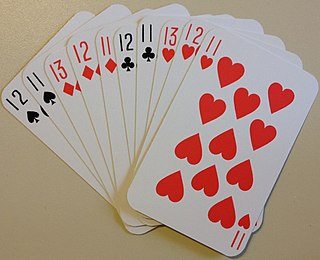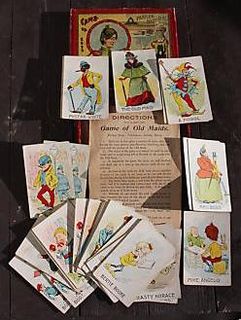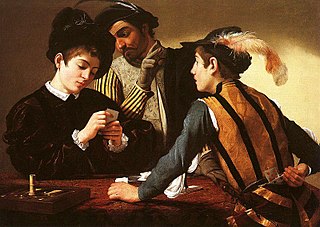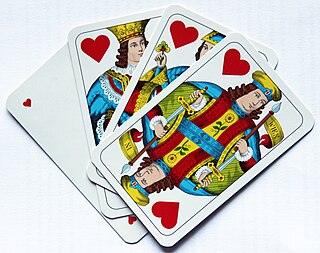 W
W500 or five hundred, also called bid Euchre is a trick-taking game that is an extension of euchre with some ideas from bridge. For two to six players, it is most commonly played by four players in partnerships, but is sometimes recommended as a good three-player game. It arose in America before 1900 and was promoted by the United States Playing Card Company, which copyrighted and marketed the rules in 1904. 500 is a social card game and was highly popular in the United States until around 1920 when first auction bridge and then contract bridge drove it from favour. 500 continues to enjoy popularity in Ohio and Pennsylvania, where it has been taught through six generations community-wide, and in other countries: Australia, New Zealand, Canada (Quebec) and Shetland. The originator of Five Hundred, US Playing Card Company of Cincinnati, Ohio, now has headquarters across the Ohio River in Erlanger, Kentucky. Five hundred is promoted by some as the national card game of Australia.
 W
WCoucou, also called As Qui Court or Hère, is an historical French card game that uses a pack of 32 or 52 cards and is played by five to twenty players. It had the originality of being played with only one card in hand. As a shedding game, there was only one winner who may claim the stakes if there are any.
 W
WBezique or Bésigue is a 19th-century French melding and trick-taking card game for two players. The game is derived from Piquet, possibly via Marriage (Sixty-six) and Briscan, with additional scoring features, notably the peculiar liaison of the Q♠ and J♦ that is also a feature of Pinochle, Binokel, and similarly named games that vary by country.
 W
WBinokel is a card game for two to eight players that originated in Switzerland as Binocle, but spread to the German state of Württemberg where it is typically played with a Württemberg pattern pack. It is still popular in Württemberg, where it is usually played in groups of three or four as a family game rather than in the pubs. In three-hand games, each player competes for himself, while in four-hand games, known as Cross Binokel (Kreuzbinokel), two teams are formed with partners sitting opposite one another. The game was introduced to America by German immigrants in the first half of the 20th century, where it developed into the similar game of Pinochle. Binocle was still played in Switzerland in 1994. In south Germany, the game is sometimes called by its Swabian name, Benoggl.
 W
WBrus is a four-hand card game of German descent that was once played in Denmark and Estonia. The game is descended from the oldest known card game in Europe, Karnöffel, a fact testified by its unusual card ranking and lack of a uniform trump suit.
 W
WCego or Baden Tarock, also called Ceco, is a tarot card game played mainly in the Upper Rhine valley, the Black Forest, the adjacent Baar lowland and around Lake Constance in Switzerland and Austria. The game is similar to Königrufen and Tapp-Tarock. It is distinguished by a large skat, or talon, called "the Blind".
 W
WÉcarté is an old French casino game for two players that is still played today. It is a trick-taking game, similar to whist, but with a special and eponymous discarding phase; the word écarté meaning "discarded". Écarté was popular in the 19th century, but is now rarely played. It is described as "an elegant two-player derivative of Triomphe [that is] quite fun to play" and a "classic that should be known to all educated card players."
 W
WEuchre or eucre is a trick-taking card game commonly played in Australia, Canada, New Zealand, Great Britain, and the United States. It is played with a deck of 24, 28, or 32 standard playing cards. Normally there are four players, two on each team, although there are variations that range from two to nine players.
 W
WFünfzehnern is a simple, German, 8-card, no-trumps, point-trick card game for four individual players using a 32-card piquet pack. The game has a simplistic card-point schedule and unusual restrictions on leading to a trick.
 W
WTempeln, also known as Meine Tante – Deine Tante, and its 32-card version, known as Naschi Waschi, German Pharaoh, Stoß or Süßmilch, are very simple historical, German, gambling card games played with French or German playing cards. They differ from the more complex Basset and Faro in that they omit aspects such as lappé, paroli, etc.
 W
WHappy Families is a traditional British card game usually with a specially made set of picture cards, featuring illustrations of fictional families of four, most often based on occupation types. The object of the game is to collect complete families, and the game is similar to Go Fish.
 W
WKaiser, or three-spot, is a trick-taking card game popular in the prairie provinces in Canada, especially Saskatchewan and parts of its neighbouring provinces. It is played with four players in two partnerships with a 32-card deck.
 W
WLorum or Lórum is an old, Hungarian, compendium card game for 4 players. Although it is the ancestor of the French game, Barbu, it is still played today. It uses a German-suited pack of 32 cards and comprises 8 individual contracts, each with different rules, each of which is played four times so that a session consists of a total of 32 individual games and lasts about 1½ hours.
 W
WTempeln, also known as Meine Tante – Deine Tante, and its 32-card version, known as Naschi Waschi, German Pharaoh, Stoß or Süßmilch, are very simple historical, German, gambling card games played with French or German playing cards. They differ from the more complex Basset and Faro in that they omit aspects such as lappé, paroli, etc.
 W
WOld Maid is a Victorian card game for two or more players probably deriving from an ancient gambling game in which the loser pays for the drinks. The game includes an element of bluffing.
 W
WPinochle, also called pinocle or penuchle, is a trick-taking, Ace-Ten card game typically for two to four players and played with a 48-card deck. It is derived from the card game bezique; players score points by trick-taking and also by forming combinations of cards into melds. It is thus considered part of a "trick-and-meld" category which also includes the game belote. Each hand is played in three phases: bidding, melds, and tricks. The standard game today is called "partnership auction pinochle".
 W
WPoker is any of a number of card games in which players wager over which hand is best according to that specific game's rules in ways similar to these rankings. Often using a standard deck, poker games vary in deck configuration, the number of cards in play, the number dealt face up or face down, and the number shared by all players, but all have rules which involve one or more rounds of betting.
 W
WPolish Bank, Polski Pachuck, Grundehrlich, Polish Red Dog or Stitch, is a gambling game using playing cards which resembles Häufeln and Mauscheln. The game is recorded as early as 1836 in the Austro-Hungarian Empire where it was banned on the grounds of being purely a game of chance or hazard.
 W
WPollack is a German card game for four players in two teams of two that resembles the Italian game of Tresette, the aim being to score as many points as possible by taking tricks containing point-scoring cards and by announcing certain hand combinations as bonuses. According to Gööck, new players quickly realise that there is quite a lot to it and only those who stay alert get opportunities to score. The game is named after a bonus for holding its three top cards: the Ten, Nine, and Ace of one suit.
 W
WPreferans or Russian Preference is a 10-card plain-trick game with bidding, played by three or four players with a 32-card Piquet deck. It is a sophisticated variant of the Austrian game Préférence, which in turn descends from Spanish Ombre and French Boston. It is renowned in the card game world for its many complicated rules and insistence on strategical approaches.
 W
WPréférence is a Central and Eastern European 10-card plain-trick game with bidding, played by three players with a 32-card Piquet deck, and probably originating in early 19th century Austria also played by Russia highest echelon. A variant known as Preferans is very popular in Russia, and other variants are played from Lithuania to Greece.
 W
WQuodlibet is a traditional card game associated with central European student fraternities that is played with William Tell pattern cards and in which the dealer is known as the 'beer king'. It is a compendium, trick-taking game for 4 players using a 32-card pack of double German playing cards.
 W
WHintersche or Hindersche [ˈhɪntɐʃə], also known as 4-Strich, is an historical card game, of the trick-avoidance genre, that is still played in the Black Forest region of Germany.
 W
WSkwitz was a 19th-century Austrian card game of the fishing type for 2 to 8 players that was said to be of English origin. It may be a descendant of Cassino which it resembles.
 W
WSolo Whist, sometimes known as English Solo or simply Solo, is a trick-taking card game for four players. Despite the name it is not related to Whist, but derives from an early form of Boston played in the Low Countries, whose direct ancestor, in turn, was the 17th-century Spanish game of Ombre. Its major distinctive feature is that one player often plays against the other three. However, players form temporary alliances with two players playing against the other two if "Prop and Cop" is the current bid. It requires four players using a standard 52 card deck with no jokers. Aces are high and the deal, bidding and play are clockwise.
 W
WTempeln, also known as Meine Tante – Deine Tante, and its 32-card version, known as Naschi Waschi, German Pharaoh, Stoß or Süßmilch, are very simple historical, German, gambling card games played with French or German playing cards. They differ from the more complex Basset and Faro in that they omit aspects such as lappé, paroli, etc.
 W
WStrohmandeln, also called Strohmandel, Strohmanntarock, Strohmanntarok, Zweiertarock, Strawman Tarock or Straw Man Tarock, is an old, two-hand card game from the Austrian branch of the Tarock family. It takes its name from the three-packet talon of four cards, the Strohmänner ("strawmen"), each player has at the start of the game. While the original game has been described as jejune, it was eventually superseded by an attractive successor which is both challenging and very exciting.
 W
WTempeln, also known as Meine Tante – Deine Tante, and its 32-card version, known as Naschi Waschi, German Pharaoh, Stoß or Süßmilch, are very simple historical, German, gambling card games played with French or German playing cards. They differ from the more complex Basset and Faro in that they omit aspects such as lappé, paroli, etc.
 W
WTapp is an old trick-taking, card game for 3 or 4 players using 36 French-suited cards that originates from the south German state of Württemberg. It is probably very old. Earlier versions were also known as Württemberg Tarock, Solo or Sans Prendre and probably originated from an attempt to play Tapp Tarock with a standard pack of, initially, Württemberg pattern cards. It is one of a family of similar games that include Bavarian Tarock, the Austrian games of Bauerntarock and Dobbm, and the American game of Frog. Although probably first played in the early nineteenth century, the game of Tapp is still a local pastime in its native Württemberg.
 W
WTempeln, also known as Meine Tante – Deine Tante, and its 32-card version, known as Naschi Waschi, German Pharaoh, Stoß or Süßmilch, are very simple historical, German, gambling card games played with French or German playing cards. They differ from the more complex Basset and Faro in that they omit aspects such as lappé, paroli, etc.
 W
WTippen, also known as Dreiblatt, Drei Karten, Dreekort, Kleinpréférence or Labet, is an historical German 3-card, plain-trick game which was popular as a gambling game for three or more players. In Denmark essentially the same game was known as Trekort. It appears to be related to the English game of 3-Card Loo. It was banned as a gambling game in some places.
 W
WTute is a trick-taking card game of the Ace-Ten family for two to four players. Originating in Italy, where it was known as Tutti, during the 19th century the game spread in Spain, becoming one of the most popular card games in the country. The name of the game was later modified by Spanish speakers, who started calling the game Tute. The game is played with a deck of traditional Spanish playing cards, or naipes, that is very similar to the Italian 40-card deck.